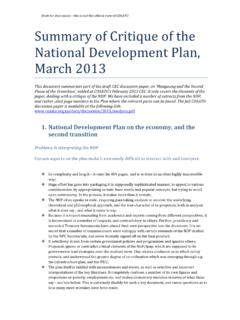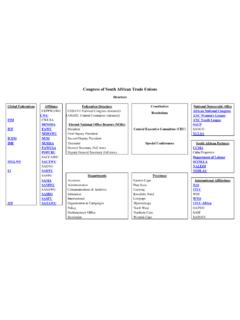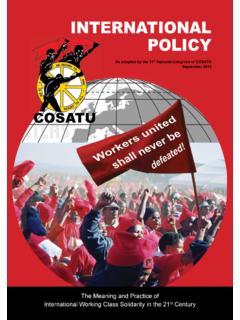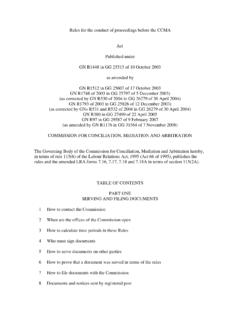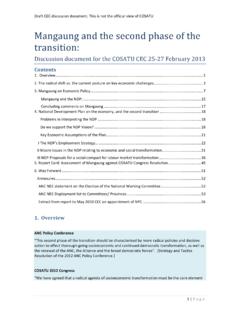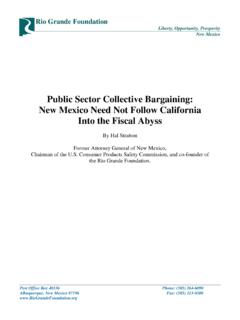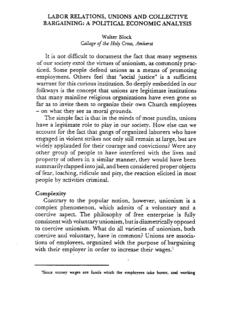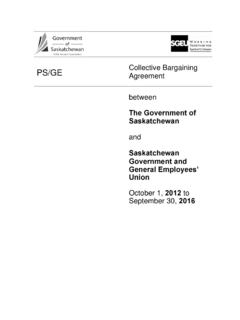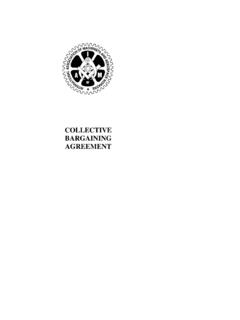Transcription of Concept paper: towards new collective bargaining, wage and ...
1 CONGRESS OF SA TRADE UNIONS 2012 Concept paper : towards new collective bargaining , wage and social protection strategies Learning from the Brazilian experience Input to COSATU CEC COSATU HOUSE Draft for internal discussion 2 | Page Concept paper : towards new collective bargaining , wage and social protection strategies Learning from the Brazilian experience Input to COSATU CEC May 28 2012 Table of Contents Summary of 3 Current Lessons from wage Strategies, and the Minimum wage ..21 Social 54 collective bargaining : the need for a new 73 References ..76 List of Draft for internal discussion 3 | Page Always bear in mind that the people are not fighting for ideas, for the things in anyone's head.
2 They are fighting to win material benefits, to live better and in peace, to see their lives go forward, to guarantee the future of their children. Amilcar Cabral Draft for internal discussion 4 | Page I. Summary of proposals The November 2011 COSATU CEC recognised that the crisis of collective bargaining and wages in the clothing sector represents a broader challenge to the labour movement, in that it reflects that current collective bargaining institutions are being constantly destabilised, that there is no coherent wage policy in the country, to address poverty and inequality amongst workers, or a coherent framework to link our labour market strategies and institutions to a broader economic development strategy.
3 At the heart of this paper therefore is an attempt to analyse the fundamental shortcomings in wage and income policies and their failure, as well as the failure of our voluntaristic collective bargaining institutions, to transform our apartheid labour market; and to then look at what shifts are required to meaningfully address these challenges. These shifts can only succeed, particularly in fighting the scourge of unemployment, if they are accompanied by radical restructuring of our economic policies. We therefore propose: The need to campaign for adoption of a national minimum wage ; The need for development of Federation wide collective bargaining strategies, to reconfigure the wage structure, and introduction of legislated mandatory centralised bargaining ; The need to campaign for universal income support to cover all adults; This package of labour market and social protection measures should lay the basis for a national agreement through the NGP, which is connected to an overhaul of our macro economic policies.
4 Where employment is threatened in crisis hit industries, a package of rescue measures needs to be devised and implemented by the parties together with government. II. Current challenges 1. The South African labour movement and workers in general, are being faced with the need to develop new strategies to qualitatively advance the position of workers in the labour market, in relation to: wages and social protection; collective bargaining ; and employment strategies. 2. Gains made by the labour movement on these fronts are constantly under attack and face reversal. Further, we have failed to make a decisive breakthrough in changing the patterns of the apartheid labour market, with limited exceptions.
5 3. At the level of wages, the many gallant struggles of workers, have not succeeded in fundamentally changing the apartheid wage structure, with the partial exception of the public service and local government, some pockets of the manufacturing sector, such as metal and engineering and less so, mining1. The wage structure remains highly stratified and unequal. The majority of black workers 1 The 4 above mentioned sectors all have achieved minimum wages of around R4000 pm, about double the average minimum for all sectoral determinations, and significant gains throughout the wage structure.
6 Draft for internal discussion 5 | Page continue to live in poverty, and low paid workers in numerous sectors receive wages way below the family subsistence level (in 2010, 50% of workers earned below R2800 per month, compared to a minimum living level of about R4000 per month). This applies not only to unorganised workers in the most vulnerable sectors, such as agriculture, domestic, retail and services. It applies to blue collar workers across the private sector, and characterises the reality of hundreds of thousands of our members. The gains that we have made in most of these sectors, while real, don't constitute a fundamental restructuring of the apartheid wage structure, or redistribution on a meaningful scale.
7 Further, the introduction of sectoral determinations in 2002, while slightly improving the situation, in most instances peg minimum wages way below the household subsistence level. 2 The system of sectoral determinations (modelled on the old wage determinations) is both partial (only covering some low paid sectors), uncoordinated, with big variations in the minima, and without any coherent rationale in terms of the basic subsistence needs of workers3. 4. Figure 1: Minimum wage levels at Sectoral Determinations4 2 According to Naledi's 2011 living wage report, the average minimum for the sectoral determinations was about R1700 per month.
8 A weighted average, which would be more accurate, would be below this, as more workers are covered by sectoral determinations on the lower end of the scale. The LRS figure for 2011 is R2118. 3 Up to today there is no agreed poverty line, or household subsistence level. Various calculations of basic subsistence requirements have been made see attached. The most credible the Household Subsistence Level or the Supplemented Living Level are way above most of the sectoral determinations. 4 Naledi 2011 living wage report Draft for internal discussion 6 | Page 5. Many of the minima in our collective agreements are not much better5.
9 While there are exceptions, many of the struggles waged by workers at best achieve incremental gains an increase of a couple of percentage points, or sometimes no change in real wages. There is therefore the danger that current strategies are in important respects reinforcing the apartheid cheap labour structure. Widespread poverty amongst workers remains a serious problem in South Africa. This is made even worse by the high levels of unemployment, and lack of social protection, leading to greater dependency on low wages something we return to below. Table 1: Current Monthly wage income of Unskilled, Semi skilled and Skilled workers in BC (excluding PSCBC)6 bargaining Council Unskilled Semi Skilled Skilled Metal and Engineering bargaining Council (National 3, 3, 6, Na ti onal Textile bargaining Co un cil 3, 3, 4, bargaining Council for Laundry, Cleanin g and Dyeing Industry (Natal) 2, 3, 3, Na ti onal bargaining Council for the Road Freight Industry bargaining Council for the Furniture Manufacturing Industry of the Wes tern Ca pe 2, 3, 3, bargaining Council for the Goods Can vas Industry (Wi ts and Pta))
10 2, 3, 3, Na ti onal bargaining Council for the Ele ctri cal Industry of SA 4, 5, 8, Building Industry bargaining Council Cape of Good Hope 2, 2, 5, bargaining Council for the Building Industry Bloemforntein 4, bargaining Council for the Fishing Industry 1, 2, 2, 5 According to Naledi's 2011 living wage report the average minimum for bargaining council agreements was about R1900 per month. A weighted average, which would be more accurate, would be above this, as more workers are covered by agreements with minima higher than this.


